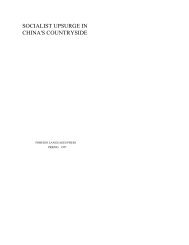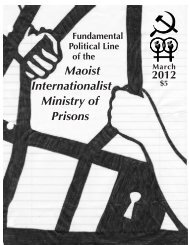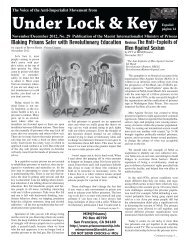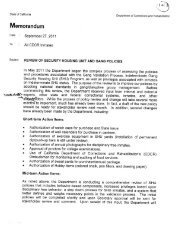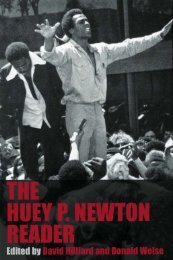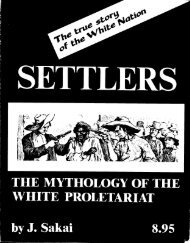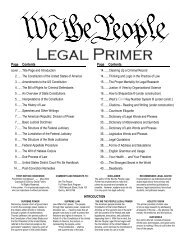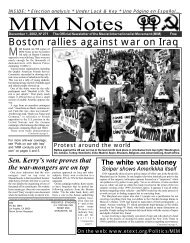Postrevolutionary China and the Soviet NEP by Henry Park
Postrevolutionary China and the Soviet NEP by Henry Park
Postrevolutionary China and the Soviet NEP by Henry Park
Create successful ePaper yourself
Turn your PDF publications into a flip-book with our unique Google optimized e-Paper software.
POSTREVOLUTIONARY CHINA<br />
AND THE SOVIET <strong>NEP</strong><br />
<strong>Henry</strong> <strong>Park</strong><br />
A comparison of <strong>the</strong> New Economic Policy (<strong>NEP</strong>) in <strong>the</strong> USSR <strong>and</strong> <strong>the</strong> economic<br />
changes in post-Mao china reveals similar modernization policies that<br />
occur in radically different historical conditions. None<strong>the</strong>less, state capitalism in<br />
both <strong>NEP</strong> Russia <strong>and</strong> post-Mao china will be shown to be <strong>the</strong> results of political<br />
struggles at crucial historical conjunctures.<br />
The <strong>NEP</strong> occurred from 1921 to about l92S-relatively early after <strong>the</strong> Russian<br />
Revolution of l9l7 <strong>and</strong> immediately following victory in <strong>the</strong> civil war that<br />
followed. The <strong>NEP</strong> was a set of capitalistic policies that included market incentives<br />
for <strong>the</strong> peasantry to increase grain production quickly <strong>and</strong> productivity<br />
measures to restore industrial production to prewar levels. Although Lenin saw<br />
<strong>the</strong> necessity of averting famine <strong>and</strong> establishing <strong>the</strong> USSR's industrial <strong>and</strong><br />
military might against foreign intervention, it would be hard to argue that a<br />
charismatic Lenin tried to institutionalize <strong>the</strong> revolution in <strong>the</strong> NEp.' The NEp<br />
was, instead, a temporary historical measure that was abolished with time <strong>by</strong><br />
Research in Political Economy, vol. 9, pages 2lg-233.<br />
Copyright @ 1986 <strong>by</strong> JAI Press Inc.<br />
All rights of reproduction in any form reserved.<br />
ISBN: 0-89232-661-l<br />
279
220<br />
HENRY PARK<br />
Stalin, who was a strong supporter of <strong>the</strong> NEp until historical circumstances<br />
changed.<br />
Both <strong>the</strong> <strong>Soviet</strong> <strong>NEP</strong> <strong>and</strong> <strong>the</strong> chinese NEp from 1960_-62 were crushed-all<br />
<strong>the</strong> more thoroughly in <strong>the</strong> chinese case because of china's hindsight with<br />
regard to soviet experience. However, since l9j6 <strong>and</strong> 197g, Chen yun <strong>and</strong> Xue<br />
Muqiao-two chinese NEp style economists have been enjoying an unprecedented<br />
heyday. Modernization <strong>the</strong>ory, convergence <strong>the</strong>ory, indeed any determinist<br />
<strong>the</strong>ory cannot explain <strong>the</strong> early appearance of <strong>the</strong> NEp <strong>and</strong> its abolition. Nor<br />
does <strong>the</strong> pull of modernization explain <strong>the</strong> swiftness <strong>and</strong> thoroughness of <strong>the</strong><br />
counterrevolution in <strong>China</strong> in 1976. A superior explanation of <strong>the</strong> similarities of<br />
<strong>the</strong> <strong>Soviet</strong> <strong>NEP</strong>, <strong>the</strong> Chinese <strong>NEP</strong>, <strong>and</strong> <strong>the</strong> post-Mao economic changes is that<br />
<strong>the</strong> <strong>NEP</strong>s were reforms <strong>and</strong> <strong>the</strong> post-Mao situation reflects a social revolution.2<br />
All three involved political choices in given historical circumstances.<br />
The similarity of <strong>the</strong> <strong>NEP</strong> <strong>and</strong> current chinese economic policy can be shown<br />
in agriculture. This leads one to ask whe<strong>the</strong>r china's current agricultural organization<br />
will meet <strong>the</strong> same fate as precollective agriculture under Stalin. will <strong>the</strong><br />
chinese communist Party recollectivize agriculture <strong>and</strong> reestablish its preeminent<br />
authority?3<br />
Perhaps at no time in history did <strong>Soviet</strong> agriculture resemble post-Mao agriculture<br />
more than during <strong>the</strong> <strong>NEP</strong>. rn 1921 in Russia, individual farmers produced<br />
92.17o of <strong>the</strong> grain available for exchange, collective farming providing<br />
<strong>the</strong> rest. ln 1924, l.3va, <strong>and</strong> in 1929 2.97o of peasants <strong>and</strong> craftsmen were<br />
employed on collective farms (Bertelheim, 1978b, p. g5). By 1930, all this<br />
changed with Stalin's drive or collectivization. Stalin's role in history <strong>and</strong> <strong>the</strong><br />
collectivization of agriculture were not inevitable, but any path toward collectivization<br />
would have undercut <strong>the</strong> role of <strong>the</strong> individual farmer on <strong>the</strong> market.<br />
Today in <strong>China</strong>, <strong>the</strong> highly collectivized pattern of l<strong>and</strong> tenure <strong>and</strong> accounting<br />
has been reversed. Formerly reliant on units of account <strong>the</strong> size of a 30- to 40-<br />
member team up through brigades (<strong>and</strong> even communes of tens of thous<strong>and</strong>s),<br />
over 50vo of chinese households have family contracts for grain production<br />
(Zweig, 1983, p. 882). Al1 <strong>the</strong> new basic forms of remuneration <strong>and</strong> organization<br />
involve a contract with units smaller than <strong>the</strong> team, whe<strong>the</strong>r remuneration be for<br />
a specialized kind of production, a family's output, or an individual's labor. The<br />
fact that private plots increased from <strong>the</strong> Cultural Revolution maximum of 5vo to<br />
l5%o in 1919 (Klatt, 1983, p. 7) is really secondary to <strong>the</strong> fact thar <strong>the</strong> only<br />
difference between family contract farming <strong>and</strong> private farming is that <strong>the</strong> l<strong>and</strong><br />
cannot be sold <strong>and</strong> sometimes <strong>the</strong> family borrows tools from <strong>the</strong> team. So-called<br />
total responsibility farming requires a minimum of product sales to <strong>the</strong> market<br />
<strong>and</strong> a tax to <strong>the</strong> state. In this form <strong>the</strong>re is no real output quota (Zweig, 1983, p.<br />
883).<br />
During <strong>the</strong> <strong>NEP</strong> <strong>the</strong> policy was <strong>the</strong> same. Indeed, <strong>the</strong> key to that reform,<br />
according to Lenin, was <strong>the</strong> replacement of requisition from <strong>the</strong> peasantry with a<br />
tax to allow a little room for "local turnover" or exchange (Lenin, 1931 , p.<br />
102).
Postreztolutionary <strong>China</strong> <strong>and</strong> <strong>the</strong> Soaiet NEp 227<br />
Both periods in question also saw occasional hired labor in <strong>the</strong> countryside,<br />
contrary to <strong>the</strong> Marxist principles forbidding <strong>the</strong> exploitation of labor power<br />
(Bettelheim, 1978b, p.97;Zweig, 1983, p. g88;Cohen, 1975,p.124). L<strong>and</strong>less<br />
<strong>and</strong> poor peasants of <strong>NEP</strong> Russia also went to <strong>the</strong> cities lookinj for work only to<br />
face restrictions on <strong>the</strong>ir registering with unemployment bureaus. ln l92l a<br />
decree limited seasonal work <strong>by</strong> peasants in <strong>the</strong> cities (Bettelheim, l97gb, pp.<br />
298' 326). ln china a long-st<strong>and</strong>ing la<strong>by</strong>rinth of administrative rules keeps<br />
<strong>China</strong>'s cities from becoming exp<strong>and</strong>ing ghettos. Those workers from <strong>the</strong> countryside<br />
who do move into <strong>the</strong> cities make up <strong>the</strong> burk of <strong>the</strong> unemployed <strong>and</strong><br />
contract workers (Blecher, 1983).<br />
The most stunning<br />
_<br />
similarity between <strong>the</strong> two periods is <strong>the</strong> Chinese Central<br />
committee's literal adoption of Bukharin's exhortation to <strong>the</strong> peasantry-including<br />
<strong>the</strong> kulaks-to "get rich. "+ An indication of <strong>the</strong> differenie bet*een <strong>the</strong> two<br />
periods is that Bukharin, even at <strong>the</strong> height ofhis influence, was rebuked fbr this<br />
slogan <strong>and</strong> general ourlook <strong>by</strong> <strong>the</strong> party (Cohen, 1975, p. 177). Today, in <strong>China</strong><br />
some peasant families make over 100,000 yuan a year. In contrast, only 6.7vo of<br />
<strong>the</strong> peasants had a per-capita income over 500 yuan a year in r9g2 (Beijing<br />
Review, April 30, 1984, p. 16).<br />
<strong>NEP</strong> Russia <strong>and</strong> present-day <strong>China</strong> share an essentially privately organized<br />
agriculture based on a new division of l<strong>and</strong>. china went r.o- u hilhly collectivized<br />
agriculture to a patriarchal rural economy in a matter of five-years. The<br />
<strong>Soviet</strong> <strong>NEP</strong> period on <strong>the</strong> o<strong>the</strong>r h<strong>and</strong> did not occur after a period oi extensive<br />
collectivization. Thus, china's agriculture took a variety oi transitional forms<br />
before it came to look like NEp Russia's. However, in industry <strong>the</strong> story is much<br />
more straightforward.<br />
In <strong>NEP</strong> Russia, financial autonomy <strong>and</strong> separation of <strong>the</strong> state <strong>and</strong> enterprises<br />
was decreed in 1921. Each firm was left a "capital" endowment. The tirm took<br />
responsibility for buying, selling, hiring, firing, <strong>and</strong> banking (Bettelheim,<br />
1978b, pp. 268-69).<br />
This was not enough, so in Aprir 1923 adecree forced firms to pursue a profit<br />
goal. The profits collected <strong>by</strong> <strong>the</strong> firm were to go to <strong>the</strong> Treasury as tax, to <strong>the</strong><br />
firm for its own reproduction, <strong>and</strong> to workers as bonuses accordin! to work done<br />
(Bertelheim, t978b, p. 210).<br />
Since l9l8 <strong>Soviet</strong> firms have been under one-man management. one-man<br />
management continued through <strong>the</strong> late 1920s despite some movements calling<br />
for greater trade union participation or <strong>the</strong> return of power to <strong>the</strong> soviets. political<br />
discussion inside factories was forbidden (Betterheim, r97gb, pp. 2r,236,<br />
246, 352).<br />
This kind of industrial organization has been copied in <strong>China</strong>. The post-Mao<br />
leaders have been pushing <strong>the</strong> autonomy of enterprises from state <strong>and</strong> party<br />
control since 1976, <strong>and</strong> marketization of industry was given renewed impetus <strong>by</strong><br />
a Central committee communiqu6 in october 19g4. Ever more freedom in<br />
b1fng, selling, hiring, firing, <strong>and</strong> salaries has been enacted (CCp, oct. 20,<br />
1984, p. 6).
222<br />
HENRY PARK<br />
The chinese also adopted <strong>the</strong> NEp view of profit. The chinese now have <strong>the</strong><br />
'.'Profit Rate of capital" as <strong>the</strong> "comprehensive Target of Assessing <strong>the</strong> opera_<br />
tion <strong>and</strong> Managemenr of Enterpriser,'iPRSu, No. :SO, Nov. 3, l9gl3, p. 4). Of<br />
<strong>the</strong> profits eamed enterprises are allowed to keep 45vo,55vo going to <strong>the</strong> state as<br />
tax. The slogan for profits is "big, medium-sized <strong>and</strong> smlll ,ti..r" fbr <strong>the</strong><br />
government, <strong>the</strong> enterprise, <strong>and</strong> workers' bonuses, respectively, just as in <strong>the</strong><br />
<strong>Soviet</strong> <strong>NEP</strong> (JPRSa, No. 392, Oct. 20,1983, p. 104).<br />
As for worker participation, <strong>the</strong> revolutionary committess of <strong>the</strong> cultural<br />
Revolution have been abolished in favor of one-man management. It is <strong>the</strong><br />
factory director who is evaluated <strong>by</strong> <strong>the</strong> profit of his factory.<br />
There continues to be talk of new experiments in workplace democracy, but so<br />
far none of <strong>the</strong>m has had any bite. ln some cases workers' congresses elect <strong>the</strong><br />
factory director, but it should be pointed out that workers' .ongi".r., are not as<br />
inclusive as <strong>the</strong> all-embracing trade unions. The congresses are often <strong>the</strong> object<br />
ofgreat apathy. In any case, <strong>the</strong> director is subject to party approval <strong>and</strong> conflicts<br />
between <strong>the</strong> workers' congresses <strong>and</strong> <strong>the</strong> director are resolved <strong>by</strong> <strong>the</strong> party (Xiao<br />
Liang, in Lin, 1982, pp. t54, 156, 157; Lockett <strong>and</strong> Littler, 1983, pi. 693-96).<br />
In actuality, democracy as described in charles Bettelheim's Cultirat Revolution<br />
<strong>and</strong> Industrial organization in <strong>China</strong> has been greatly curtailed. Like Lenin<br />
who wanted more work <strong>and</strong> less of "all this 'ideology' <strong>and</strong> all this chatter,"<br />
especially during <strong>the</strong> <strong>NEP</strong> (Lenin, 1937, p. 262), Deng is constantly decrying<br />
"empty talk." The Cultural Revolution custom of putting up big character<br />
posters to criticize one's bosses <strong>and</strong> political leaders has been made illegal. one<br />
woman in Shenyang put up a poster criticizing her boss <strong>and</strong> received a one-year<br />
jail sentence under laws conceming labor discipline (Mann, 19g4, p. c6).<br />
The 1978 constitution removed four rights to proletarian democracy guaranteed<br />
<strong>by</strong> <strong>the</strong> 1975 constitution- "speaking out freery, airing views fully, holding<br />
great debates <strong>and</strong> writing big character posters" (Selden, 1979, p.575). The<br />
1978 constitution also "prohibits any person from using any means whatsoever<br />
to disrupt <strong>the</strong> economic order of <strong>the</strong> society" (Selden, 1979, p.693). In short,<br />
<strong>the</strong> industrial <strong>and</strong> agricultural organization of <strong>the</strong> two periods has been similar.<br />
Therefore, it is not surprising that many o<strong>the</strong>r economic changes of <strong>the</strong> two<br />
periods are similar.<br />
The new economic structures <strong>and</strong> incentives engendered an ever greater market<br />
<strong>and</strong> competition in both periods. In an attempt to increase what he called<br />
local turnover, Lenin ended up establishing a "nationwide free market"-..<strong>the</strong><br />
hallmark of <strong>NEP</strong>" (Cohen, 1975, p. 124). This included a marker for labor<br />
power. Although agreements were often collective agreements made through<br />
trade unions, <strong>Soviet</strong> <strong>NEP</strong> only had a minimum wage stipulation in <strong>the</strong> bargaining<br />
between management <strong>and</strong> workers (Bettelheim, 1978b, p. 242).<br />
china's agriculture, which has never provided its farmers huge margins over<br />
survival as in <strong>the</strong> United States, manages to produce over 60vo for exchange as of<br />
1986-up from40Vo in 1978 (Beijing Review, No. 9, 1984, p. 4; No. 2g. 19g6.
Postreaolutionarq <strong>China</strong> <strong>and</strong> <strong>the</strong> Souiet NEp 223<br />
281. As<br />
!.<br />
explained before, industrial suppliers <strong>and</strong> consumers also meet<br />
through contracts now. Increasingly, china resembles <strong>the</strong> imperfect market societies<br />
of <strong>the</strong> West.<br />
is not surprising<br />
.This<br />
because it is self-defeating to establish profit as <strong>the</strong><br />
criterion of production <strong>and</strong> <strong>the</strong>n have prices that do not reflect tire ability of<br />
management to work <strong>the</strong>ir workers hard for low wages or to employ <strong>the</strong> cheapest<br />
techniques of production. profit rates only have meaning where ihere is some<br />
freedom for prices to float.<br />
Not surprisingly in both economic systems, competition <strong>and</strong> questions concernlng<br />
technology came to <strong>the</strong> fore. Lenin came out during <strong>the</strong> NEp for ..socialist<br />
competition":<br />
Socialism does not extinguish competition; on <strong>the</strong> contrary, it for <strong>the</strong> first time creates <strong>the</strong><br />
opportunity fbr employing it on a really wide <strong>and</strong> on a reaily mass scale, fbr drawing actually<br />
<strong>the</strong> majority of <strong>the</strong> population into an arena of labour in which <strong>the</strong>y can display <strong>the</strong>iiabilities,<br />
reveal <strong>the</strong>ir talents, which are an untapped spring among <strong>the</strong> people, <strong>and</strong> which capitalism<br />
crushed, suppressed <strong>and</strong> strangled in thous<strong>and</strong>s <strong>and</strong> millions (Lenin, 1937, p.413).<br />
He also noted that capitalist competition involves servile behaviour on <strong>the</strong> part of<br />
<strong>the</strong> masses, financial fraud, <strong>and</strong> despotism (Lenin, 1937, p. 413).<br />
The post-1976 chinese economists have criticized Stalin <strong>and</strong> have said that<br />
competition exists as long as <strong>the</strong>re is commodity production. The trick is to<br />
recognize it <strong>and</strong> channel it to increase production. This kind of competition does<br />
not include <strong>the</strong> role of <strong>the</strong> masses that Lenin described, but it is a fair indication<br />
of <strong>the</strong> problem of both <strong>the</strong> NEp <strong>and</strong> current <strong>China</strong> (wang Haibo, in Lin, 19g2,<br />
pp. I l6-l l7).<br />
It is a small step from underst<strong>and</strong>ing <strong>the</strong> importance of free markets <strong>and</strong><br />
competition to a profit-oriented economy to seeing why advanced technique<br />
became an obsession for both NEp Russia <strong>and</strong> post-Mao china. only <strong>the</strong> cheapest<br />
techniques of production survive profit_driven competition.<br />
ln 192'7 in <strong>the</strong> USSR, one official's <strong>the</strong>ory of socialism was that ,.socialism is a<br />
technically higher stage of deveropment of society" (Kui<strong>by</strong>shev, quoted in Bettelheim,<br />
1978b' p. 3r2). Lenin himself once defined socialism as <strong>Soviet</strong>s plus<br />
electrification. Industry <strong>and</strong> agriculture "must be rebuilt on <strong>the</strong> last word in<br />
science' You know that this basis is electricity, that only when <strong>the</strong> whole country,<br />
all branches of industry <strong>and</strong> agriculture have been electrified, only when you<br />
have mastered this task, will you be able to build for yourselves <strong>the</strong> bommunist<br />
society" (Lenin, 1937, p. 473).<br />
- Deng Xiaoping <strong>and</strong> ,his modernization supporters in <strong>the</strong> party have arways<br />
been determined on this score. "It is <strong>by</strong> <strong>the</strong> adoption of tire most advanced<br />
technologies that <strong>the</strong> industrially backward countries catch up with <strong>the</strong> indus_<br />
trially advanced" (Selden, ed., 1979, p.66g). Fur<strong>the</strong>.-o.", ..to atrain our<br />
magnificent goal [<strong>the</strong> Four Modernizations] in <strong>the</strong> final analysis it is a matter of<br />
how to arouse this group of people who have mastered <strong>the</strong> knowredse of science
224<br />
HENRY PARK<br />
<strong>and</strong> technology so as to give play to <strong>the</strong>ir enthusiasm <strong>and</strong> role" (JpRSb, No.<br />
210, oct. 13, 1983, p.30). According to <strong>the</strong> post-Mao leadership, <strong>the</strong> inremational<br />
technological revolution "presents both new opportunities <strong>and</strong> new chal_<br />
lenges to our economic growth', (CCp, Oct. 20, iFtga, p. 3).<br />
This spirit of competing on an international scale conditioned both NEp <strong>and</strong><br />
post-Mao leaders to regard employment as something subordinate to technique.<br />
The <strong>Soviet</strong> economist Strumilin calculated that <strong>the</strong> investment of <strong>the</strong> First Five<br />
could only<br />
_YearPlan<br />
create 400,000 industrial jobs (Bettelheim, tgigb, p.296).<br />
Post-Mao economists made <strong>the</strong> same calculation. Between 2g <strong>and</strong> 77.7g bilion<br />
yuan per year would have to be invested <strong>by</strong> <strong>the</strong> state merely to hire vouth<br />
entering <strong>the</strong> workforce-an impossibiliry (Fang Sheng in Lin. 19g2.;. l;0;.<br />
obviously, both calculations assumed a prevailing tevet of technology.<br />
Unemployment increased both in <strong>the</strong> soviet NEp period <strong>and</strong> in dhina after<br />
Mao. unemployment rose steadily throughout <strong>the</strong> NEp period. At 1.34 million<br />
in 1924, <strong>the</strong> figure dipped with a new method of calculation <strong>and</strong> <strong>the</strong>n rose ro over<br />
a million in 1925t26 to 1.3 million in l92i <strong>and</strong> t.t million in 1929 (Bettelheim,<br />
1978b, pp.294,295). According to Chinese economist Fang Sheng, <strong>China</strong> is<br />
exp<strong>and</strong>ing employment, but "at present, an additional 7 million people are<br />
joining <strong>the</strong> waiting lists for jobs every year" (Fang, in Lin, tgg2, ;. t^SO). fn<br />
1979, urban unemployment was estimated at 10 to 25 million. At 20 million, <strong>the</strong><br />
nonagricultural unemployment rate would be li or lgvo (Emerson, l9g3 , p . 2) .<br />
Even more ominously <strong>the</strong>re is trend toward underemployment in <strong>the</strong> countryside<br />
given <strong>the</strong> new techniques <strong>and</strong> organization of farming. one estimate puts surplus<br />
labor at one-third (watson, 1983, p. 710). For supposedly socialist societies, this<br />
kind of unemployment is embarrassing to say <strong>the</strong> least.<br />
The unemployment in both countries reflects a segmented labor force. In<br />
1928, 43.6vo of registered <strong>Soviet</strong> unemployed were between <strong>the</strong> ages of lg <strong>and</strong><br />
24. Ano<strong>the</strong>r 30.8(/o were between <strong>the</strong> ages of 24 <strong>and</strong> 29 (Bettelheim, l97gb, p.<br />
327). ln china, <strong>the</strong> end of <strong>the</strong> countryside movement where<strong>by</strong> urban-educated<br />
youth went to work in <strong>the</strong> countryside meant an immediate doubling of <strong>the</strong><br />
unemployment rate. of <strong>the</strong>se unemployed urban youth, J\vo are women (Emerson,<br />
1983, pp. 4 <strong>and</strong> 16). Already women are heading back to <strong>the</strong> home for lack<br />
of regular work <strong>and</strong> because of <strong>the</strong> new responsibility system which rewards<br />
domestic work on family plots. In at least one county in zhejiang, over govo of<br />
female laborers have no regular assignments (croll, 19g3, p. 29). Thedivision of<br />
<strong>the</strong> laboring classes <strong>by</strong> age, sex, <strong>and</strong> residential area has opened <strong>the</strong>m up to<br />
coercion for profit in china, whereas in Cultural Revolution <strong>China</strong> <strong>the</strong>re was no<br />
unemployment (Mason, 1976, p. 7).<br />
coercion of labor out of labor power in <strong>the</strong> soviet NEp meant that 50-607o of<br />
large-scale industry workers <strong>and</strong> mineworkers had piece wages in 1925.In 192g,<br />
large-scale industries were discovered to be 60-90vo based on piece rates (Bettelheim,<br />
1978b, p. 244). Lenin himself endorsed rhis system:
Postreoolutionary <strong>China</strong> <strong>and</strong> <strong>the</strong> Soaiet NEp 225<br />
when <strong>the</strong> whole of production is directed towards satisfying <strong>the</strong> needs of <strong>the</strong> toilers <strong>the</strong>mselves,<br />
wage rates <strong>and</strong>.bonuses shourtr be closery connected with <strong>and</strong> dependent upon <strong>the</strong><br />
degree of fulfilment of <strong>the</strong> production pran. Bonuses in kind <strong>and</strong> <strong>the</strong> partial payment of wages<br />
in kind must be gradualry transformed into a system of supplying <strong>the</strong> workers in accordance<br />
with <strong>the</strong> degree of productivity of labor (Lenin, 1937, pp. 24_25).<br />
During <strong>the</strong> cultural Revolution in china piece rates <strong>and</strong> scientific managemenr<br />
were abolished <strong>and</strong> bonuses nearly wiped out (Tung, 19g2, pp. 143, lg3).<br />
However, recent changes have tied income so closery io bonur"s thut u r"pu.ur.<br />
tax on enterprises for bonuses came into being in order to control inflation <strong>and</strong> to<br />
keep firms from h<strong>and</strong>ing out bonuses to eveiyone in egalitarian fashion. Moreover,<br />
<strong>the</strong> state abolished <strong>the</strong> limit holding bonuses to two months of a worker,s<br />
salary (Beijing Review, No. 26, 19g4, p. a).<br />
Finally, post-Mao <strong>China</strong> took <strong>the</strong> right to strike out of <strong>the</strong> constitution <strong>and</strong><br />
cited Lenin during <strong>the</strong> NEp to do it. Liao Gailong published an article on <strong>the</strong> rore<br />
of chinese trade unions, adopting whoresale arguments fiom Lenin's rgz2 arricle<br />
on trade unions. The articre points out that strikes could only be temporarily<br />
iustified as a means of confronting bureaucratic distortions in <strong>the</strong> proletarian state<br />
(JPRSa, No. 373, Augusr lj, 1993, pp. a0_46).<br />
Similarities between <strong>the</strong> soviet NEp ind <strong>the</strong> so-called reforms of <strong>the</strong> economy<br />
in post-Mao china are striking. Even <strong>the</strong> officiar phrasing is often exactry <strong>the</strong><br />
same. one might be tempted to argue that <strong>the</strong> post-Mao leadership has a clear<br />
legacy from Lenin for its efforts. If post-Cultural Revolution <strong>China</strong> is state<br />
capitalis<strong>the</strong>n so is Lenin's USSR.<br />
In.fact, this<br />
_<br />
is precisely <strong>the</strong> case. Economically speaking5 <strong>China</strong> <strong>and</strong> NEp<br />
Russia are <strong>the</strong> same. However, <strong>the</strong> political policies conceiring <strong>the</strong> economic<br />
policies are different. Briefly stated, Lenin viewed <strong>the</strong> NEp as a state capitalist<br />
tactic to combat individual economy <strong>and</strong> various modes of production in <strong>the</strong><br />
USSR that were less advanced than state capitalism.<br />
For example, Lenin viewed <strong>the</strong> question oi bonur", as a temporary one ..under<br />
present social conditions" (Lenin , rg37, p.24). In contrast, according to an<br />
economic editor for Beijing Review, "Some people have said china,s current<br />
stress on <strong>the</strong> role of bonuses is a capitalist oa. Granted <strong>the</strong> basis<br />
of <strong>the</strong> workers' contributions, <strong>the</strong> bonus ensures -.tt <strong>the</strong> principle -urntyon of .to each according<br />
to his work,' <strong>and</strong> is a socialist wage system', (No. 26, lgg4,p. 4). Typically,<br />
what Lenin thought to be temporary capitalist methods u." ,""n u, permanent <strong>and</strong><br />
characteristic of socialism <strong>by</strong> <strong>the</strong> post_Mao leaders. 6<br />
ln 1928, two NEp economists explained <strong>the</strong> rore of piece rates: ..In distinction<br />
from.<strong>the</strong> capitalist system, <strong>the</strong>se measures are of a temporary in <strong>Soviet</strong><br />
Russia; as <strong>the</strong> socialist consciousness of <strong>the</strong> worker is deveioped "l.,uru.t".<br />
<strong>and</strong> as <strong>the</strong><br />
individualist<br />
ord<br />
outlook is outlived, both piecework <strong>and</strong> tr," ,on'putro.f minimum<br />
st<strong>and</strong>ard will become unnecessary" (quoted in Bettelheim, t9ZSU, p. 24e.
226 HENRY PARK<br />
As for markets, Lenin's frequent statement was that "freedom to trade means<br />
going back to capitalism" (Lenin, 1937, p. lll).7 Likewise for cooperative<br />
societies: "Under <strong>the</strong> conditions prevailing in Russia at present, freedom <strong>and</strong><br />
rights for <strong>the</strong> co-operative societies mean freedom <strong>and</strong> rights for capitalism. It<br />
would be stupid <strong>and</strong> criminal to close our eyes to this obvious truth', (Lenin.<br />
1937,p. 183).8 None<strong>the</strong>less, he called this state capitalism with advantages for<br />
<strong>the</strong> time.e<br />
In <strong>the</strong> political report of <strong>the</strong> Central Committee to <strong>the</strong> Eleventh party congress<br />
in March 1922, Lenin said that "<strong>the</strong> whole of our New Economic policy, is <strong>the</strong><br />
application <strong>by</strong> us communists of commercial methods, of capitalist methods"<br />
(Lenin, 1937, pp.332-33). Furrhermore, those who said rhat rhe NEp was<br />
permanent "evolution" <strong>and</strong> not just "tactics," Lenin called "frank enemies"<br />
(Lenin, 1937 , pp . 346-l) . Thus, he treated as counterrevolutionaries those Mensheviks<br />
<strong>and</strong> Social Revolutionaries that said that <strong>the</strong> NEp was exactly what <strong>the</strong>y<br />
had advocated all along. The point to Lenin was that <strong>the</strong> NEp was nor suprahistorical<br />
<strong>and</strong> <strong>the</strong> right thing all along (Lenin, 1937, p. 3a!.<br />
Still, Lenin recognized that economic reforms could impact on <strong>the</strong> superstructure.<br />
The <strong>NEP</strong> "means transition to <strong>the</strong> restoration of capitalism to a considerable<br />
degree. To what degree we do not know" (Lenin, 1937 , p. 2601.ro ln 1923,<br />
he asked whe<strong>the</strong>r or not <strong>the</strong> " 'Nepmen,' i.e. , <strong>the</strong> new bourgeoisie" would win<br />
over <strong>the</strong> peasantry <strong>and</strong> break <strong>the</strong> worker-peasant alliance (Lenin, 1937, p. 386).<br />
History in <strong>the</strong> USSR shows that <strong>the</strong> "<strong>NEP</strong>men" were wiped out <strong>by</strong> Stalin's<br />
"revolution from above." Impatience with <strong>the</strong> <strong>NEP</strong> was a continuing <strong>the</strong>me of<br />
<strong>the</strong> splits in <strong>the</strong> Communist Party. The downfall of rrotsky largely had to do with<br />
his position in favor of exacting a tribute from a militarized peasant labor force for<br />
<strong>the</strong> benefit of speedier industrial development. Later zinoviev <strong>and</strong> Kamenev of<br />
<strong>the</strong> Politburo accelerated <strong>the</strong>ir attacks on <strong>the</strong> state capitalism of <strong>the</strong> NEp. The<br />
<strong>NEP</strong> lasted through <strong>the</strong>se initial assaults of <strong>the</strong> mid-1920s, but <strong>the</strong>re was continuous<br />
vigilance concerning <strong>the</strong> political line of<strong>the</strong> party. In particular Lenin concerned<br />
himself with <strong>the</strong> temptation of <strong>the</strong> petty bourgeoisie to join <strong>the</strong> Bolshevik party<br />
simply because it was <strong>the</strong> ruling party (Lenin, 1931, pp. 253,322).<br />
The end of <strong>the</strong> <strong>NEP</strong> was largely a result of fears that, as <strong>the</strong> NEp continued,<br />
<strong>the</strong> kulaks (rich peasants) would gain increasing political influence-that <strong>the</strong><br />
tinkering in <strong>the</strong> relations of production that allowed free trade <strong>and</strong> private agriculture<br />
would work <strong>the</strong>ir way into <strong>the</strong> superstructure.l I However, <strong>the</strong>re was also<br />
a concern with <strong>the</strong> historical development of <strong>the</strong> forces of production. The easy<br />
gains of restoring pre-World War I production were running out <strong>by</strong> <strong>the</strong> end of<br />
<strong>the</strong> 1920s. Industry revived quickly from 1923 to 1926. One year saw growth of<br />
607o <strong>and</strong> <strong>the</strong> next 407o. "Unemployed capital" was in motion l5%o of <strong>the</strong> time<br />
<strong>by</strong> 1925. Thus <strong>the</strong> most ardent defender of <strong>the</strong> <strong>NEP</strong> <strong>and</strong> <strong>the</strong> <strong>NEP</strong>'s <strong>the</strong>orerician-<br />
Nikolai l. Bukharin-started to concern himself in 1926 with how to exp<strong>and</strong><br />
industrial capacity <strong>and</strong> not just utilize existing capacity (Cohen, 1975, p. 2lO).<br />
Moreover, <strong>the</strong> harvest since 1926127 declined in 1921128 <strong>and</strong> asain in 1929
Postreaolutionary <strong>China</strong> <strong>and</strong> <strong>the</strong> Sooiet NEp 227<br />
(Bertelheim, r97gb, pp. 333, 341), although <strong>by</strong> official NEp doctrine <strong>the</strong>re were<br />
still easy gains to be had with private agricurture. Finally, <strong>the</strong> rast straw was <strong>the</strong><br />
procurement crisis, which was viewed as a result of a kulak strike. charles<br />
Bettelheim shows that this procurement crisis should not have been blamed on<br />
<strong>the</strong> kulaks, who were not significant enough to cause <strong>the</strong> problem of f-eeding <strong>the</strong><br />
cities. None<strong>the</strong>less, <strong>the</strong> govemment struggled through administrative measures<br />
to obtain grain for <strong>the</strong> cities. Although Stalin's errors worsened <strong>the</strong> crisis, <strong>the</strong>re<br />
seemed to be a case for moving on to new relations of production that would root<br />
out <strong>the</strong> kulaks' political influence, resolve <strong>the</strong> procurement problem, <strong>and</strong> prepare<br />
large-scale agriculture to make contributions to industrialization.<br />
The <strong>Soviet</strong> <strong>NEP</strong> came into being essentiaily because of a food crisis created <strong>by</strong><br />
world war I, <strong>the</strong> civil war, <strong>and</strong> foreign intervention. According to Lenin, ,,<strong>the</strong><br />
fundamental <strong>and</strong> principal reason for <strong>the</strong> change is <strong>the</strong> extraordin-arily acute crisis<br />
of peasant farming" (193j, p. 150).<br />
At a <strong>the</strong>oreticalevel, Lenin showed that <strong>the</strong> state capitalism of <strong>the</strong> NEp was a<br />
progressive development given <strong>the</strong> reality of <strong>the</strong> USSR,s ..at least five difl-erent<br />
social systems" (1937, pp. 159*160). These included nomadic producrion,<br />
small-scale commodity production, private capitalism, state capitalism, <strong>and</strong> socialism.<br />
The enemy of <strong>the</strong> NEp was <strong>the</strong> petty bourgeoisie or small-scale production'<br />
State capitalism if effected would simplify <strong>the</strong> economy <strong>and</strong> ease <strong>the</strong><br />
transition to socialism (Lenin. 1937. pp. 159-6gj.rz<br />
This capitalism held "no terrors" as long as <strong>the</strong> Bolsheviks held <strong>the</strong> ..com_<br />
m<strong>and</strong>ing heights" of <strong>the</strong> economy-"factories, works, transport <strong>and</strong> fbreign<br />
trade" (Lenin , 1931 , pp. 159-60). while <strong>the</strong> uSSR's *u, not socialist<br />
".ono-y<br />
<strong>and</strong> only aspired to state capitalism during NEp, "political power will remain in<br />
<strong>the</strong> h<strong>and</strong>s of <strong>the</strong> working crass <strong>and</strong> of <strong>the</strong> workers' state" (fenin , lg3i , p. 162).<br />
Socialism meant <strong>the</strong> political intention <strong>and</strong> capability to move onto socialist<br />
economrc organization. Thus, when conditions in <strong>the</strong> uSSR no longer included a<br />
war-devastated economy <strong>and</strong> a food crisis, it is not surprising that tie Bolsheviks<br />
moved on from <strong>the</strong> NEp.<br />
The chinese had <strong>the</strong>ir own NEp from 1960 to 1962. According to <strong>the</strong> u.s.<br />
9""111 Intelligence Agency (cIA), agriculturar producrion a.opp"i 3rvo during<br />
<strong>the</strong> "Grear Leap" period from t95g to 1960. Industrial production dropped42vo<br />
from 1960 to 1961 (van Ness <strong>and</strong> Raichur, 19g3, p. 7j. During this short NEp<br />
private farming increased_to 50vo in some provinc"i.t. Bu."uuciatic authority in<br />
industry was also streng<strong>the</strong>ned.ra However, production did increase. .fhe state<br />
also demonstrated its ability to cut investment.15 The NEp ended in 1962 <strong>by</strong><br />
Mao's efforts to bring class struggle to <strong>the</strong> fore <strong>and</strong> <strong>by</strong> <strong>the</strong> Cultural Revolution,<br />
but <strong>the</strong> heroes of <strong>the</strong> NEp-chen yun, Liu shaoqi, <strong>and</strong> Xue Muqiao-are <strong>the</strong><br />
living <strong>and</strong> posthumous leaders of post_Mao <strong>China</strong>.<br />
Herein lies <strong>the</strong> difference between <strong>the</strong> <strong>Soviet</strong> NEp <strong>and</strong> present-day <strong>China</strong>. The<br />
current leaders of china are <strong>the</strong> targeted capitalist-roader.s of <strong>the</strong> Cultural Revo_<br />
lution. The victory of <strong>the</strong> capitalist-roaders culminated in <strong>the</strong> 1976 arrest of <strong>the</strong>
228<br />
HENny pARK<br />
leadership of <strong>the</strong> Cultural Revolution-<strong>the</strong> so-called Gang of Four. Various<br />
splits within <strong>the</strong> revolutionary left including <strong>the</strong> coup attempt <strong>by</strong> Lin Biao, who<br />
was second in comm<strong>and</strong> to Mao, left <strong>the</strong> Cultural Revolution vulnerable in l9l6<br />
when Mao finally died. The arrest of <strong>the</strong> Gang of Four cleared <strong>the</strong> way for <strong>the</strong><br />
rehabilitation of Deng Xiaoping <strong>and</strong> his allies. The coup d'etat of 1916 <strong>by</strong> Hua<br />
Guofeng <strong>and</strong> supporters of Deng signaled <strong>the</strong> political counterrevolution of <strong>the</strong><br />
current period (see Bettelheim, 1978a).<br />
However, if <strong>the</strong>re were only a political counterrevolution in <strong>China</strong>, this argument<br />
would be as weak as <strong>the</strong> argument that when <strong>the</strong> Chinese Communist party<br />
(cCP) becomes threatened remobilization will occur <strong>and</strong> <strong>the</strong> reforms of this<br />
current <strong>NEP</strong> period ended. what does it mean to say that <strong>the</strong> cCp feels threatened?<br />
Likewise, what does it mean to say that a party is "revisionist" or<br />
"counterrevolutionary"'l In Marxist <strong>the</strong>ory, <strong>the</strong>re is little role for social psychology.<br />
In fact, <strong>the</strong> chinese under Mao abolished sociology <strong>and</strong> o<strong>the</strong>r social sciences<br />
for fragmenting knowledge <strong>and</strong> making ahistorical assumptions about<br />
conflict-free society (Siu, l98l).<br />
In place of <strong>the</strong> social sciences, <strong>the</strong> chinese studied political economy (political<br />
science, sociology, <strong>and</strong> economics), dialectical materialism (phitosophy), <strong>and</strong><br />
history or historical materialism. The Maoist charge of "revisionism" points to<br />
an omission of <strong>the</strong> fundamental Marxist emphasis on class struggle <strong>and</strong> revolution<br />
for <strong>the</strong> dictatorship of <strong>the</strong> proletariat. A person's politics could be judged <strong>by</strong><br />
his or her attitude toward workers' participation in management <strong>and</strong> politics, for<br />
instance, or <strong>the</strong> depiction of classes in art, or <strong>the</strong> role of political priorities in<br />
science. Still, at root <strong>the</strong> Shanghai School of Political Economy, which included<br />
<strong>the</strong> leading <strong>the</strong>oreticians of <strong>the</strong> Cultural Revolution, saw <strong>the</strong>se issues of political<br />
policy as based in group interests.<br />
A "revisionist" in <strong>the</strong> top ranks of <strong>the</strong> CCP was considered to be in a position<br />
to implement policies in his/her own class interests-<strong>the</strong> bourgeoisie's interest.<br />
Policies such as exacerbating <strong>the</strong> division of labor, exp<strong>and</strong>ing <strong>the</strong> role of bourgeois<br />
right (<strong>and</strong> hence stratification) in terms of distribution, <strong>and</strong> removing<br />
workers from workplace <strong>and</strong> administrative control can be viewed as <strong>the</strong> policies<br />
favoring <strong>the</strong> urban, skilled, administrative bourgeoisie. Thus, while it is possible<br />
to discuss endlessly <strong>the</strong> politics <strong>and</strong> ideology of Deng Xiaoping, <strong>the</strong> Shanghai<br />
School of Political Economy points to <strong>the</strong> eventual influence of revolution <strong>and</strong><br />
counterrevolution in <strong>the</strong> relations of production. (See <strong>the</strong> essay <strong>by</strong> Peter Christensen<br />
<strong>and</strong> Jorgen Delman in <strong>the</strong> bibliography or read <strong>the</strong> Shanghai political<br />
economy text under wang, ed.) Hence, in this paper it has been to <strong>the</strong> relations<br />
of production after <strong>the</strong> coup of 1916 that we have turned. The material interests<br />
of <strong>the</strong> current ruling alliance must be examined.<br />
The CCP has succeeded in implementing economic changes not in a time of<br />
crisis as after world war I <strong>and</strong> civil war or after <strong>the</strong> Great Leap period. According<br />
to <strong>the</strong> figures of <strong>the</strong> 1984 Chinese government, every sector of <strong>the</strong> economy<br />
grew substantially during <strong>the</strong> period from 1967 to 19i6. National income grew
Postreztolutionary <strong>China</strong> <strong>and</strong> <strong>the</strong> Soaiet NEp 229<br />
an average of 4.970 annually; output grew 6.g0/o annually. From 1966to 1916<br />
output rncreased'7'17o, while population grew 26vo. Even <strong>the</strong> most tumultuous<br />
part of <strong>the</strong> Cultural Revolution from 1966 to 1969 saw rapid growth. 1970,s<br />
output was 24Vo above 1966's (Beijing Review, March 19, lgg+, pp.2l_2g).<br />
More indicative than <strong>the</strong> lack of a production crisis is <strong>the</strong> lack oi p"uy .orr,-<br />
modity production in china in 19i6. The post-Mao leaders are not using capitalism<br />
to combat petty commodity production, which <strong>by</strong> all accounts was severely<br />
restricted if not nonexistent in Cultural Revolution <strong>China</strong>. L<strong>and</strong> tenure<br />
contracts for periods of several years are to ensure <strong>the</strong> peasantry of <strong>the</strong>ir l<strong>and</strong> <strong>and</strong><br />
<strong>the</strong>refore a material interest in <strong>the</strong> cunent political alignment. The peasants often<br />
outraced <strong>the</strong> party to so-called reform <strong>by</strong> secret family farming. In one case, a<br />
team split up to work on a family basis <strong>and</strong> was stopped <strong>by</strong> <strong>the</strong> commune parry<br />
secretary. The secretary was in turn overruled <strong>by</strong> <strong>the</strong> county, prefecture, <strong>and</strong><br />
provincial leadership. The provincial secretary said, "No mattei what methods<br />
<strong>the</strong>y adopt, as long as <strong>the</strong>y help <strong>the</strong> team increase agricultural production, make<br />
more contributions to <strong>the</strong> state, accumulate more funds for <strong>the</strong> collective. <strong>and</strong><br />
gain more income for <strong>the</strong> peasants, <strong>the</strong>y are good methods" (Beijing Review,<br />
March 19, 1984, p. 20).<br />
At <strong>the</strong> industrial level, Susan Shirk has pointed out that Deng has sacrificed<br />
<strong>the</strong> economy to an imperfect market where local bureaucrats conirol pricins <strong>and</strong><br />
output because "politically it brings provincial of,ficials into <strong>the</strong> reiorm Joalition"<br />
(shirk, 1984, p. l5). Making use of oksenberg's pluralist interpretation of<br />
<strong>the</strong> various interests at work in <strong>the</strong> government, Shirk points outihat ..each<br />
minister is similar to a division head in a huge conglomerate called .china<br />
Incorporated' " (Shirk, 1984, p. I l). The contending interests in <strong>China</strong> Incorporated<br />
are agreed on current economic organization-state capitalism.<br />
At this point even if <strong>the</strong> Deng regime were to cast away its political history <strong>and</strong><br />
reintroduce class struggle <strong>and</strong> mobilization <strong>the</strong>mes, it would not be able to<br />
reestablish socialist control of <strong>the</strong> economy. over 50o/o of investment occurs<br />
outside of <strong>the</strong> state budget. l6 Attempts to control investment even in <strong>the</strong> broadest<br />
measures have failed. According to Nicholas Lardy, as in <strong>the</strong> Chinese NEp, <strong>the</strong><br />
leaders called for a reduction of investment from about 32va to about 25vo or<br />
27Vo,but in fact <strong>the</strong> rate of accumulation has increased (Lardy, l9ga, p. 3).<br />
Indeed, post-Mao <strong>China</strong> has seen an unprecedented string of yeais of accumulation.lT<br />
where <strong>the</strong> state did invest, agriculture was supposed to receive greater<br />
promrnence under <strong>the</strong> cuffent leadership, but industrial interests ended up predominating.<br />
Investment in agriculture sank from ll.lo/a in 1979 to 6.lvo in l9g2<br />
of <strong>the</strong> state budget (Lardy, 1984, p. 5). Finalry, repeated attempts to increase<br />
state revenue brought an actual decline in state revenue. presently, state revenue<br />
continues to increase at a rate slower than <strong>the</strong> profits of <strong>the</strong> enterprises.l8<br />
"Although china's conditions today are vastly different from those of Russia<br />
at that time (<strong>NEP</strong>) when its economy was in extreme difficulties, our practical<br />
experience has proved that this idea [not to plan <strong>the</strong> whole economy but to let
230<br />
HENRY PARK<br />
market forces do <strong>the</strong>ir jobl of Lenin's was not only applicable to <strong>the</strong> Russia of<br />
that day, it is also of lasting significance" (ccp, oci. 20, lgg4, p. k7). post-<br />
Mao <strong>NEP</strong>ists wanted a permanent NEp <strong>and</strong> <strong>the</strong>y have succeeded in establishing<br />
it in <strong>the</strong> absence of a production crisis. They claim to control <strong>the</strong> comm<strong>and</strong>ins<br />
heights of <strong>the</strong> economy-rabor power, l<strong>and</strong>, mines, banks, railwavs ana ail<br />
state-owned enterprises (ibid., p. k8), but in reality <strong>the</strong>y have surreniered <strong>the</strong>m<br />
to particular interests <strong>and</strong> commodity mystification-going so far as to enshrine<br />
<strong>the</strong> law of "aggregate social dem<strong>and</strong>" <strong>and</strong> "aggregate social supply" (ibid., p.<br />
kl0). Ra<strong>the</strong>r than use state capitalism to smash precapitalist formations<br />
<strong>and</strong> to supervise <strong>the</strong> petty bourgeoisie as in NEp Russia, ".ono-i.<br />
<strong>the</strong> Chinese now<br />
unleash <strong>the</strong> market to ensure that only "<strong>the</strong> best survive" (ibid., p. kl2).<br />
we can only hope that some of <strong>the</strong> post-Mao leaders who are purhing <strong>the</strong> ccp<br />
for <strong>the</strong> honest repudiation of Marxism are successful (FBIS, No. z:2, l2lj lg4,<br />
p. kl). It is far better for <strong>the</strong> ccp to denounce Marx (<strong>and</strong> Mao) as a dead dog<br />
than for <strong>the</strong> CCP to discredit socialism with <strong>the</strong> double-talk required to defend its<br />
capitalist social revolution. Unfortunately, <strong>the</strong> cCp's very weakness in a society<br />
which has experienced socialist revolution prevents its openly repudiating socialism.<br />
what <strong>the</strong> Bolsheviks made sure to cail temporary of capitalism,<br />
<strong>the</strong> Chinese counterrevolutionaries call socialism.<br />
NOTES<br />
-.uiu.",<br />
l. Although all <strong>the</strong>ories are open to varied interpretations <strong>and</strong> claimants, <strong>China</strong> scholar M.<br />
Oksenberg once said that "in essence, <strong>the</strong> Cultural Revolution was an attempt <strong>by</strong> Mao <strong>and</strong> his<br />
associates to remove those government <strong>and</strong> Party cadres who he perceived to be ineff'ective <strong>and</strong> to<br />
draw upon a fresh organization-<strong>the</strong> PLA-in <strong>the</strong> modemization effort" (oksenberg, 196g, p.24).<br />
Of course, <strong>the</strong> same is being said today of Deng except that Deng is drawing on Cultural Revolution<br />
outcasts. If both Cultural Revolution <strong>and</strong> post-Mao <strong>China</strong> are marke
Postreaolutionanl <strong>China</strong> <strong>and</strong> <strong>the</strong> Soaiet <strong>NEP</strong><br />
zJl<br />
constitute <strong>the</strong> overwhelming majority of <strong>the</strong> population only <strong>by</strong> means of a number of special<br />
transitional measures which would be totally unnecessary in countries with developed capitalism,<br />
countries in which wage workers constitute <strong>the</strong> overwhelming majority in industry <strong>and</strong> agriculture"<br />
(ibid., p. 107).<br />
'7. For similar remarks, see ibid., pp. 179, 237,292.<br />
8. "The small commodity producers' co-operative societies . . . inevitably give rise to pettybourgeois<br />
capitalist relations, facilitate <strong>the</strong>ir development, push small capitalists into <strong>the</strong> foreground<br />
<strong>and</strong> benefit <strong>the</strong>m most. It cannot be o<strong>the</strong>rwise since <strong>the</strong> small proprietors predominate <strong>and</strong> exchange<br />
is possible <strong>and</strong> necessary" (Lenin, 1937, p. 183).<br />
9. "'Co-operative'capitalismunder<strong>the</strong><strong>Soviet</strong>governmentisavarietyof statecapitalism,<strong>and</strong><br />
as such it is advantageous <strong>and</strong> useful for us at <strong>the</strong> present time" (Lenin, 1937, p.183). "Our<br />
Socialist problems would be facilitated if state capitalism became <strong>the</strong> predominant economic system<br />
in Russia" (Lenin, 1937, p.282).<br />
10. "Can we, to a certain extent, restore fieedom to trade, freedom for capitalism for <strong>the</strong> small<br />
farmer, without at <strong>the</strong> same time cutting at <strong>the</strong> roots of <strong>the</strong> political power of <strong>the</strong> proletariat'? Can it be<br />
done? It can, for <strong>the</strong> question is one of degree" (Lenin, 1937, p. 1121. "There are ei<strong>the</strong>r small<br />
proprietors who own means of production <strong>and</strong> whose whole mentality <strong>and</strong> habits of life are capitalistic-<strong>and</strong><br />
<strong>the</strong>y cannot be anything else-or wage workers with an altoge<strong>the</strong>r different mentality"<br />
(Lenin, 1937, p. 125).<br />
I I. There was a parallel threat on <strong>the</strong> "left." Antipeasant Trotsky <strong>and</strong> <strong>the</strong> Workers' Opposition<br />
continued agitation among workers <strong>and</strong> would have increased <strong>the</strong>ir efforts had workers been adversely<br />
affected <strong>by</strong> <strong>the</strong>ir alliance with <strong>the</strong> peasantry. In 1926, Trotsky said <strong>the</strong> opposition would attempt to<br />
overthrow <strong>the</strong> <strong>Soviet</strong> govemment in time of war (Mavrakis, 1976, p. l2). A small party in <strong>the</strong><br />
countryside, <strong>the</strong> Bolsheviks had to grant <strong>the</strong> Socialist Revolutionary agrarian program in full to<br />
achieve <strong>the</strong> revolution in 1917. The weakness of <strong>the</strong> party lef't little room fbr error in maintaining <strong>the</strong><br />
worker-peasant alliance.<br />
12. "We must expose <strong>the</strong> error of those who fail to recognise <strong>the</strong> petty-bourgeois economrc<br />
conditions <strong>and</strong> <strong>the</strong> petty-bourgeois element as <strong>the</strong> principal enemy of Socialism in our country"<br />
(Lenin, 1937, p. 165). Lenin also made clear what <strong>the</strong> eventual goal was <strong>by</strong> <strong>the</strong> example of <strong>the</strong> state<br />
farms <strong>and</strong> in words constituting a vision. "lf peasant farming can develop still fufiher, we must<br />
firmly assure <strong>the</strong> transition to <strong>the</strong> next stage; <strong>and</strong> <strong>the</strong> next stage will undoubtedly be <strong>the</strong> gradual<br />
amalgamation of <strong>the</strong> least profitable <strong>and</strong> most backward, small <strong>and</strong> disintegrated peasant farming into<br />
social, large-scale agriculture. This is how Socialists have always pictured it. This is exactly how our<br />
Communist Party looks upon it" (Lenin, 1937, p. l5l). How long would this take? "In <strong>the</strong> course of<br />
several years . . come what may . . . <strong>NEP</strong> Russia will be transformed into Socialist Russia' (Nov.<br />
20,1922) (Lenin, 1937, p. 381).<br />
13. The Chinese <strong>NEP</strong> in agriculture "involved (a) <strong>the</strong> restoration ofprivate plots, (b) <strong>the</strong> use of<br />
<strong>the</strong> household as <strong>the</strong> main accounting unit in communcs. (c) <strong>the</strong> assumption <strong>by</strong> enterprises in<br />
communes of sole responsibility for profit <strong>and</strong> output quotas" (Wheelwright <strong>and</strong> McFarlane, 1970,<br />
p. 67). "By 1962, <strong>the</strong> private grain harvest in Yunnan was larger than <strong>the</strong> collective harvest, <strong>and</strong><br />
private cultivated l<strong>and</strong> rose to fifty percent of<strong>the</strong> total. In Kweichow <strong>and</strong> Szechuan Provinces <strong>the</strong>re<br />
was, even as late as 1964, more private than collective tilling" (Wheelwright <strong>and</strong> McFarlane, 1970,<br />
p. 68). According to Schurmann, "while <strong>the</strong> ideology remains ofihodox, <strong>the</strong> country as a working<br />
system of organization seems at times suspiciously similar to Yugoslavia" (quoted in Wheelwright<br />
<strong>and</strong> McFarlane, 1970, p. 69).<br />
14. In industry, <strong>the</strong> party committee was removed from day{o-day management in <strong>the</strong> factories;<br />
<strong>the</strong> factory manager was given more authority under Po I-po's Seventy Articles, which also reestablished<br />
profit in comm<strong>and</strong>, piece work, <strong>and</strong> material incentives in comm<strong>and</strong> (Wheelwright <strong>and</strong><br />
McFarlane, 1970, pp. 72,73; Committee for a Proletarian Party, 1981, pp. 85 86).<br />
15. From 196l-65, "<strong>the</strong> investment rate f'ell <strong>by</strong> more than half compared to <strong>the</strong> years of <strong>the</strong><br />
Great Leap Forward (1958-1960)" (Lardy, 1984, pp 3-4).<br />
16. Extrabudgetary investment was l6.JVo of <strong>the</strong> total in 1978 <strong>and</strong> climbed to 5O.2Vo in 1982
zJz<br />
HENRY PARK<br />
(JPRSa,No 37l,Aug. 12, lgg3,p. ll6). Inrgg5,extrabudgeraryinvestmentcontinuedroswamD<br />
srate rnvestment. "From January to July this year, state budgetary investment was brought under<br />
control However, due to <strong>the</strong> excessively drastic increase in extra-budgetary investment <strong>and</strong> investment<br />
in local projects, state investment in capital construction still tended to grow. State<br />
budgetary investment increased onry <strong>by</strong> 1.3 billion yuan, or g.g percent, over tie corresponding<br />
period last year, but extrabudgetary investment increased <strong>by</strong> l0.9 billion yuan, or 90 percent, ' (FB IS,<br />
9t4t85, pp. k6 7).<br />
17 ' The cunent Chinese leadership decries <strong>the</strong> investment levels of <strong>the</strong> Great Leap <strong>and</strong> <strong>the</strong><br />
Cultural Rcvolution, particularly <strong>the</strong> 1958 antl 1970 budgets, bur "rhe third setback came rn 1978 . .<br />
appropnation for capital construction accounte
Postreaolutionnry <strong>China</strong> <strong>and</strong> <strong>the</strong> Soaiet <strong>NEP</strong><br />
zJ,)<br />
Enrcrson, John P. (1983) "Urban School-Lcavcrs <strong>and</strong> Unemployment in <strong>China</strong>." <strong>China</strong> Qrutrterly,<br />
No. 93 (March).<br />
Foreign Broadcast Information Service (FBIS) Daily Report <strong>China</strong>. tJ.s. covemment Comp. <strong>and</strong><br />
trans.<br />
Joint Publications Research Service (JPRSa). <strong>China</strong> Economit Afj.arr.r, series. Comp., U.S.<br />
Covcrnmcnt.<br />
Joint Publications Research Service (JPRSb) <strong>China</strong> science <strong>and</strong> rechnobgt scries. comp., U.S.<br />
Govemment.<br />
Klatt, W. (19u3) "StafTof Lif'e: Living St<strong>and</strong>ards in <strong>China</strong> l9l'7-1981 ." <strong>China</strong> Quartcrlt, No. 93<br />
(March).<br />
Lardy, Nicholas (1984) "Changes in <strong>the</strong> Pattems of Resource Allocation." Conference on "To<br />
Reform <strong>the</strong> Chinese Political Order, Harwich Port, MA: June 18-23.<br />
Lin Wei <strong>and</strong> Chao, Arnold (eds.),(1982) <strong>China</strong>'s Economic. Reforms. Philadelphia, PA: University<br />
of Pennsylvania Press.<br />
Lenin, V. (.1937\ Selected Works, Vol. 9: New Economic Policy Soc.ialist Construction. London:<br />
Lawrence & Wishart.<br />
Locken, Martin <strong>and</strong> Littler, Craig R. (1983) "Trends in Chinese Entcrprise Management." In<br />
Chirut's Changed Road to Development. (World Development Special Issue August), Neville<br />
Maxwell (ed.), Elmsford, New York: Pergamon Press.<br />
Mann,Jim(1984) "Why<strong>China</strong>'sWorkersAreUnhappy." SanFrancistoChronit.le, October3l,p.<br />
cb.<br />
Mason, Geoff (1916) Economic Planning in <strong>China</strong>. New Zeal<strong>and</strong>: New Zeal<strong>and</strong> <strong>China</strong> Society.<br />
Mavrakis, Kostas (1976) On Trotskl,ism: Problems of Theory <strong>and</strong> Hisnr,t. London <strong>and</strong> Boston:<br />
Routledge & I(egan Paul.<br />
Maxwell, Neville, (ed.) (1983) <strong>China</strong>'s Changed Road to Devektpment. (World Developmcnt,<br />
special issue, August). Elmsford, New York: Pergamon Press.<br />
Oksenberg, M. (1968) "Occupational Groups in Chinese Society <strong>and</strong> <strong>the</strong> Cultural Revolution." In<br />
The Cultural Revolution: 1967 in Review. Ann Arbor: University of Michigan Press.<br />
Selden, Mark ed. (1979) The People's Republic oJ<strong>China</strong>: A Do(:umentary History of Revolutionary<br />
Change. New York: Monthly Review Press.<br />
Selden, Mark <strong>and</strong> Lippit Victor, eds. (1982) The Transition to Socialism in <strong>China</strong>. Armonk, New<br />
York: Sharpe.<br />
Shirk, Susan L. (1981) "Political Economy of Chinese Industrial Reform." Conference on "To<br />
Reform <strong>the</strong> Chinese Political Order," Harwich Port, MA: June l8-23.<br />
Siu, Bob<strong>by</strong> (1981) "Sociology <strong>and</strong> Socialism in Contemporary <strong>China</strong> <strong>by</strong> Siu-lun Wong/review<br />
essay." Bulletin of Concemed Asian Scholars, l3: No. 2 (April-June).<br />
State Statistical Bureau (1985) "Communiqu6 on Fulfillment of <strong>China</strong>'s 1984 Economic <strong>and</strong> Social<br />
Development Plan." (March 9).<br />
Sweezy, Paul (1980) Post-Revolutionary Society. New York: Monthly Review Press.<br />
Tung, Rosalie (1982) Chinese Industrial Society After Mao. Lexington, MA: Lexington, Books.<br />
Van Ness, Petcr <strong>and</strong> Raichur, Stish (1981) "Dilemmas of Socialist Development: An Analysis of<br />
Strategic Lines in <strong>China</strong>, 1949 1981." Bulletin of Concerned Asian Scholars, l5: No. l<br />
(January February).<br />
Wang, George C. (ed.) <strong>and</strong> intro. ( 1977) Fundamentals of Political Econony. Armonk, New York:<br />
Sharpe.<br />
Watson, Andrew (1983) "Agriculture looks for'Shoes that Fit': The Production Responsibility<br />
System <strong>and</strong> its Implications. " ln <strong>China</strong>'s Changed Routl to Development. (World Development,<br />
special issue, August) Neville Maxwell (ed.) Elmsford, New York: Pergamon Press.<br />
Wheelwright, E. L. <strong>and</strong> McFarl<strong>and</strong>, Bruce (1970) The Chinese Road to Socialism. New York:<br />
Monthly Review Press.<br />
Zweig, Adam (1983) "Opposition to Change in Rural <strong>China</strong>: The System of Responsibility <strong>and</strong><br />
People's Communes." Asian Survey, No. 7 (July).



